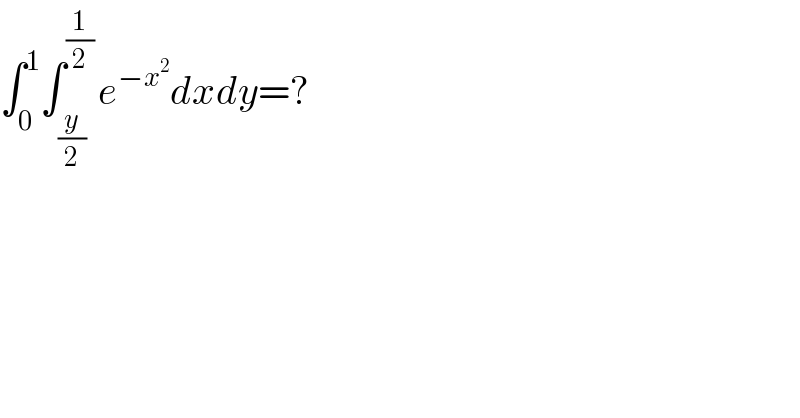
Question and Answers Forum
Question Number 66550 by Tony Lin last updated on 17/Aug/19

Commented by ~ À ® @ 237 ~ last updated on 17/Aug/19
![let named it I I=∫∫_D e^(−x^2 ) dxdy with D={(x,y) / 0<y<1 , (y/2)<x<(1/2) } we ought to transform that domain , in the way to start the integration on y ( if not it will be on x ) D={(x,y) / 0<x<(1/2) , 0<y<2x } ( you can see it better with a graph) Now I=∫_0 ^(1/2) (∫_0 ^(2x) e^(−x^2 ) dy) dx = ∫_0 ^(1/2) [ye^(−x^2 ) ]_0 ^(2x) dx=∫_0_ ^(1/2) 2xe^(−x^2 ) dx =[−e^(−x^2 ) ]_0 ^(1/2) =−e^(−(1/4)) +1 So I=1− e^((−1)/4)](Q66570.png)
Commented by Tony Lin last updated on 17/Aug/19

| ||
Question and Answers Forum | ||
Question Number 66550 by Tony Lin last updated on 17/Aug/19 | ||
 | ||
Commented by ~ À ® @ 237 ~ last updated on 17/Aug/19 | ||
![let named it I I=∫∫_D e^(−x^2 ) dxdy with D={(x,y) / 0<y<1 , (y/2)<x<(1/2) } we ought to transform that domain , in the way to start the integration on y ( if not it will be on x ) D={(x,y) / 0<x<(1/2) , 0<y<2x } ( you can see it better with a graph) Now I=∫_0 ^(1/2) (∫_0 ^(2x) e^(−x^2 ) dy) dx = ∫_0 ^(1/2) [ye^(−x^2 ) ]_0 ^(2x) dx=∫_0_ ^(1/2) 2xe^(−x^2 ) dx =[−e^(−x^2 ) ]_0 ^(1/2) =−e^(−(1/4)) +1 So I=1− e^((−1)/4)](Q66570.png) | ||
Commented by Tony Lin last updated on 17/Aug/19 | ||
 | ||